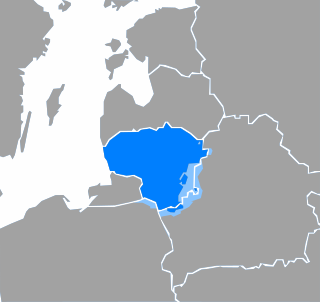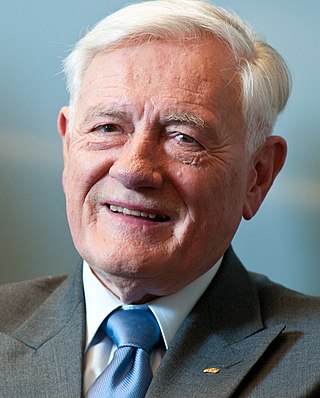
A voivodeship is the highest-level administrative division of Poland, corresponding to a province in many other countries. The term has been in use since the 14th century and is commonly translated into English as "province".

Lithuanian is an East Baltic language belonging to the Baltic branch of the Indo-European language family. It is the language of Lithuanians and the official language of Lithuania as well as one of the official languages of the European Union. There are approximately 2.8 million native Lithuanian speakers in Lithuania and about 1 million speakers elsewhere. Around half a million inhabitants of Lithuania of non-Lithuanian background speak Lithuanian daily as a second language.

The Grand Duchy of Lithuania was a sovereign state in northeastern Europe that existed from the 13th century, succeeding the Kingdom of Lithuania, to the late 18th century, when the territory was suppressed during the 1795 partitions of Poland–Lithuania. The state was founded by Lithuanians, who were at the time a polytheistic nation of several united Baltic tribes from Aukštaitija. By 1440 the grand duchy had become the largest European state, controlling an area from the Baltic Sea in the north to the Black Sea in the south.

Valdas Adamkus is a Lithuanian politician, diplomat and civil engineer who served as the fifth and seventh president of Lithuania from 1998 to 2003 and again from 2004 to 2009.

Sportin Lithuania is governed by the Physical Education and Sports Department following the country's independence from the Soviet Union in 1990. The Lithuanian government established the department to manage physical education in the schools and sports administration in the country. Over the next few years, Lithuanian sports organizations established membership in international governing bodies. Lithuania participated in the Winter Olympics in Albertville and has participated in every Winter and Summer Olympics since.

The Lithuania national football team represents Lithuania in men's international football, and is controlled by the Lithuanian Football Federation, the governing body for football in Lithuania. They played their first match in 1923. In 1940, Lithuania was occupied by the Soviet Union; the country regained its independence in 1990 and played their first match thereafter against Georgia on 27 May of that year.

Panevėžio Ekranas is a Lithuanian football club, from the city of Panevėžys. It won 7 top-tier champion and 5 national cup titles throughout its existence.

The June Uprising was a brief period of the history of Lithuania in late June 1941 between the first Soviet and the Nazi occupations.

Saulius Štombergas is a retired Lithuanian professional basketball player, basketball coach and businessman. Štombergas is one of the greatest Lithuanian basketball players of all time, and he was also considered to be a great team leader, as he managed to play very well under pressure, and at the end of games. He was also known for his 3-point shooting ability.

The Kingdom of Lithuania was a sovereign state that existed from the 17 July 1251 until the death of the first crowned king of Lithuania, Mindaugas, on 12 September 1263. Mindaugas was the only Lithuanian monarch crowned king with the assent of the Pope and the head of the first catholic Lithuanian state. The formation of the kingdom is widely regarded as a partially successful attempt at unifying all surrounding Baltic tribes, including the Old Prussians, into a single unified state under a common king.

The Ponary massacre, or the Paneriai massacre, was the mass murder of up to 100,000 people, mostly Jews, Poles, and Russians, by German SD and SS and the Lithuanian Ypatingasis būrys killing squads, during World War II and the Holocaust in the Generalbezirk Litauen of Reichskommissariat Ostland. The murders took place between July 1941 and August 1944 near the railway station at Ponary, a suburb of today's Vilnius, Lithuania. 70,000 Jews were murdered at Ponary, along with up to 2,000 Poles, 8,000 Soviet POWs, most of them from nearby Vilnius, and its newly formed Vilna Ghetto.

Lithuania–United States relations are the bilateral foreign relations between Lithuania and the United States. Lithuania is one of the most pro-United States nations in the world, with 73% of Lithuanians viewing the U.S. positively in 2011. According to the 2012 U.S. Global Leadership Report, 48% of Lithuanians approve of U.S. leadership, with 20% disapproving and 32% uncertain.

The Holocaust resulted in the near total eradication of Lithuanian (Litvaks) and Polish Jews[a] in Generalbezirk Litauen of the Reichskommissariat Ostland in the Nazi-controlled Lithuania. Of approximately 208,000–210,000 Jews at the time of the Nazi invasion, an estimated 190,000 to 195,000 were killed before the end of World War II, most of them between June and December 1941. More than 95% of Lithuania's Jewish population was murdered over the three-year German occupation, a more complete destruction than befell any other country in the Holocaust. Historians attribute this to the massive collaboration in the genocide by the non-Jewish local paramilitaries, though the reasons for this collaboration are still debated. The Holocaust resulted in the largest loss of life in so short a period of time in the history of Lithuania.
The Lithuanian A Lyga 1998–99 was the ninth season of top-tier football in Lithuania. The season started on 10 July 1998 and ended on 13 June 1999. 13 teams participated and FK Žalgiris Vilnius won the championship.
The Lithuanian Christian Democratic Party was a Christian-democratic political party in Lithuania.

The National Defence Volunteer Forces or NDVF is a branch of the Lithuanian Armed Forces. Volunteer forces were officially established on 17 January 1991 by the law of the Supreme Council of Lithuania on the National Defence Volunteer Service providing basis for establishing Voluntary National Defence Service. This decision made legal already existing volunteer formations that began appearing as early as 1990. Voluntary National Defence Service was reorganised into the National Defence Volunteer Force. In 2003 Volunteer Force was integrated into the Lithuanian Land Force. Tasks of volunteer soldiers were inevitably altered when Lithuania became a full-fledged member of NATO: approach of territorial defence was changed into territorial defence and training of modern active reserve. There are around 5000 volunteers and around 800 professional soldiers in the force.

The Lithuania women's national football team represents Lithuania in international women's football and is controlled by the Lithuanian Football Federation, the governing body for football in Lithuania.

Capital punishment in Lithuania was ruled unconstitutional and abolished for all crimes on 9 December 1998. Lithuania is a member of the Council of Europe and has signed and ratified Protocol 13 of the European Convention on Human Rights on complete abolition of death penalty. From March 1990 to December 1998, Lithuania executed seven people, all men. The last execution in the country occurred in July 1995, when Lithuanian mafia boss Boris Dekanidze was executed.

The State Security Department or VSD is a Lithuanian intelligence agency which collects information on threats to national security and works to eliminate those threats. The VSD also conducts counterintelligence, protects state secrets and classified information, and vets certain applicants for residence permits or entry to Lithuania.
















